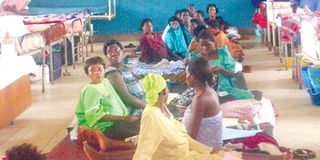Prime
Are midwives to blame for deaths during child delivery?

Mothers in Mulago hospital ward after giving birth. FILE PHOTO
Although many young mothers have continuously complained that midwives are rude and negligent, Sister Miriam Namugere a midwife trainer at the Ministry of Health says it’s not true. She narrates her experince to Eunice Rukundo
For years after she graduated as a midwife in 1991 Sister Miriam Namugere delivered babies in Mulago before joining the Ministry of Health (MOH) where she has for the past five years participated in training in-service midwives. Her most memorable moments, good and bad, however lie within the walls of Mulago labour wards. The times a mother and /or baby she didn’t expect to survive delivery eventually walked out of hospital alive made for Namugere’s most rewarding career moments, each time leaving her elated and energized to perform as many deliveries as possible that day.
There were days however a case she thought was going well instantly turned fatal killing mother, baby or both, despite everything they did to save them. Those left her drained of all desire to continue as a midwife and they account for her most disheartening career moments. Incidentally, her first of these was not far from when she had just joined midwifery, as she narrates;
“I was still a student and had wanted to conduct a delivery under supervision so when my supervisor called to say there was a woman in stage two she wanted me to deliver I was excited and gave it my all. When the baby came out however, it was not only dead but its skin was also peel! The mother also started bleeding profusely, leaving me panicky and wondering what I had done wrong.” But it hadn’t been her fault as her supervisor later explained that she had known the baby had died in the womb days back hence the peeling skin but hadn’t wanted to tell her. “We managed to save the mother and that soothed me although I can never forget that incident.”
Passion to bring forth life is what undoubtedly motivates this mature motherly lady in her midwifery career and I cant imagine her shouting obscenely at a labouring woman, abusing, mistreating or neglecting a newborn as is generally alleged of midwives in this country. And indeed she assures me she had never abused anyone under her watch, taught any midwife to do so or even witnessed any of her colleagues do it, although she doesn’t dispel the allegations that she is definitely not hearing it for the first time.
Also, instead of leaping to the defensive like you would expect anyone on the accused side, she simply after careful thought says, “You see, the public we serve needs to help us to help them but this would only be after the public understood us in regard to what our duties to them are and the conditions under which we operate. Without dwelling on specific incidences however you would appreciate that the majority of the midwives try to do their best under the circumstances.” And she gets into explaining the said circumstances by expounding on what life is like working as a midwife in this country.
A midwife’s workday in Mulago
It is a breathless day for a midwife in the National Referral hospital, where the bulk of these allegations are actually levelled. There are on average four midwives on duty at a time attending to admissions, theatre cases, new mothers without any idea what to do and all the other labouring mothers’ needs. “There is no taking a break and in fact, it is usually too overwhelming you find yourself missing luxuries like lunch, especially on peak days which seem like there are 100 mothers being delivered in a single day,” recounts Namugere.
She is however quick to add that at least in Mulago, although the midwives are overworked, their eight hour long shifts are honoured and sometimes they can actually work below the required five days a week and can cater to family. “This is how I was able to look after my family and raise my own two children. I don’t know how the midwives upcountry, where you find a delivery unit closes when a midwife gets indisposed, manage.” She says the average is two midwives on duty per health unit, working week long, day and night.
The making of a midwife
Namugere’s preferred professions as a young girl were to be a doctor or an accountant; they seemed like the most successful in Iganga where she grew up. After her O level in Wanyange Girls’ Secondary school however, she was for reasons she would rather not get into unable to continue with her education so she went for a three year course in nursing at Mulago. She started off as a supervisor in Apac where she realised that the department she was ignorant about was the midwifery section. “I like to be independent so I decided to study midwifery as well and that was how I ended up a midwife, before later mastering in health service management in Nkozi in 1996 to join MOH as a trainer,” she recounts.
Basic midwifery training in this country is otherwise a three year long diploma course after A level, at Mulago, although there are other levels of entry into the profession. Namugere for instance only trained for one and a half years before starting work in Mulago in 1991 because she already had basic nursing training.
A midwife is trained to care for a woman before and during pregnancy, labour, delivery and about 42 weeks of breastfeeding after delivery. “In the labour ward our duty is to admit mothers and only help them with normal deliveries. We are not required to do c-sections, but most people don’t know so they blame us for faults outside our areas of operation,” clarifies Namugere.
She explains that when a mother is checked into hospital for delivery, a midwife is only supposed to admit them, and wait for further instructions from a doctor. “During this wait however is when most women start to say they were neglected because they don’t understand that a doctor under normal circumstances is supposed to attend to them first.”
Midwifery hardships
Outside what any understanding person would expect of an overworked underpaid servant like the impatience and irritability, Namugere says she believes there are shortcomings the public also blames them for only out of ignorance; the floor deliveries for instance, inability to attend to every mother in labour and lack of facilities. “The unassisted deliveries, women on floors, lack of basic facilities and the war between mothers and midwives to have their own is all because the system is understaffed, under facilitated and thus incapable of offering quality services, not the midwives fault,” she argues.
Namugere says the situation would improve if their clients helped the midwives to help them, as labour management needs people to contribute in different ways. If a mother can have as much of what will be required, be ready to corporate with the midwife and learn as much as possible of what will be required of them, it would help the overworked and tired midwife help them better.




